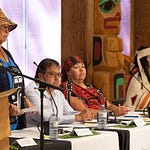Clallam County is poised to grant $800,000 in public funds to Habitat for Humanity—but key questions about transparency remain unanswered. Despite promises of openness, Habitat has withheld documents, backed out of a meeting, and cited questionable incidents to justify cutting off dialogue. The line between nonprofit mission and public accountability has become blurred. When taxpayer dollars are involved, who’s really keeping track?
At this week’s regular meeting, the Clallam County Board of Commissioners is expected to award $800,000 in public funds to Habitat for Humanity of Clallam County. The decision follows a six-month delay, during which Habitat agreed to bring its Carlsborg development into compliance with public bidding requirements.
That delay raised important questions: What happens to public oversight once tax dollars move from government hands into private nongovernmental organizations (NGOs)? And how should the public engage with organizations that request—and receive—significant public funding?
A new role, an old concern
Habitat for Humanity of Clallam County is the only affiliate in the nation to have hired a Native American Housing Liaison, a role funded by a public grant (tax dollars). This followed a $50,000 donation from the Jamestown S’Klallam Tribe. While Habitat maintains that the liaison position is not connected to tribal preference, community members have asked to see the job description in order to better understand the position’s scope.
That document has not been shared, despite multiple requests over a period of months. In a climate where transparency is increasingly expected of organizations receiving public support, this silence is puzzling.
“Transparency is important to us, and we recognize the value of making key information readily available. However, as with all nonprofit initiatives, progress takes time. That does not mean work isn’t happening—it simply means we are moving forward at a sustainable pace.” — VP Danny Steiger
A request for silence
In a message to CC Watchdog, Habitat Vice President Danny Steiger wrote:
“I request that you refrain from mentioning Habitat for Humanity or any individuals when discussing this matter. The focus should remain on constructive engagement rather than singling out people or organizations.”
The intention behind this request may have been to lower tensions. But when public money is involved, it’s natural—and necessary—for the public to ask questions. Constructive engagement works best when there’s a shared commitment to open dialogue.
Misunderstandings or mischaracterizations?
In multiple emails and phone calls, Steiger cited two incidents involving CC Watchdog readers as reasons Habitat had become more cautious about communication—one occurred at a job site, and another involved the spouse of an employee at their workplace.
The job site visit, in particular, raises questions. Steiger described it as an event in which “construction work was briefly halted” after a reader “confronted” Habitat team members. However, that encounter had already played out publicly in the comments section of a CC Watchdog article.
There, a Habitat carpenter named Ben Bower had invited readers to visit him on-site:
“If you’re curious about what else we’re doing, I’d love for you to join me… Come talk with me.”
A reader took him up on the offer.
Bower emphasized, “You’re welcome anytime.”
The two met. According to that reader, who called me on the way home from visiting the construction site, the meeting went well—civil, productive, and informative. The notion that it caused construction to be halted or was in any way confrontational is not consistent with Eric Fehrmann’s account.
It’s unclear whether the incident was relayed inaccurately to Habitat leadership, or whether concerns grew out of later assumptions. Either way, this appears to have been a good-faith meeting, not a disruption. Unfortunately, it became part of a broader justification for why Habitat would no longer engage with CC Watchdog.
“…words have impact. Your platform reaches many people, and while most engage responsibly, some may act impulsively. I ask that you urge your readers to use appropriate channels if they have concerns rather than taking personal actions that could have unintended consequences.” — VP Danny Steiger
Shifting commitments
In early March, Steiger wrote to CC Watchdog:
“We would like to invite you to meet with myself, Mark Hodgson, and Colleen Robinson… We’d be happy to discuss Habitat for Humanity’s mission… and any questions you may have.”
That meeting was welcomed and accepted—but it never happened.
Despite follow-ups, and a request for the Native American Housing Liaison’s job description in advance, the invitation was not honored. And while there were mentions of updated websites and future transparency, those promises have yet to materialize in any concrete way.
“Additionally, we are in the process of updating our website to make much of the information you’ve requested more accessible. Our goal is to enhance community outreach and encourage greater engagement in our mission to build affordable homes.” — VP Danny Steiger
Steiger later clarified that he would no longer serve as a source of information for CC Watchdog, citing his evolving role and concerns about privacy and safety.
That’s understandable to a degree—but it also underscores the central issue. Public-facing organizations, particularly those receiving taxpayer support, have a responsibility to communicate clearly and directly with the public.
Respecting the mission, requesting accountability
Habitat for Humanity does important work in Clallam County. Its efforts to build affordable housing are meaningful, and its staff and volunteers deserve appreciation. But public dollars come with public responsibility.
It’s fair to ask questions about how grant funds are spent. It’s fair to expect clarity around new positions that intersect with community priorities and sensitive topics. And it’s fair to revisit claims of transparency when key documents remain unavailable and agreed-upon meetings don’t take place.
In today’s environment, transparency isn’t a luxury—it’s the foundation of trust. Habitat, like any organization partnering with local government, has an opportunity to build that trust by honoring its commitments and engaging the public openly.
Get engaged
The Commissioners will review and consider approval of the agreement with Habitat at their meeting tomorrow, Tuesday, July 8, at 10:00 a.m. The meeting will take place at the courthouse, 223 East 4th Street, Room 160, in Port Angeles.
Instructions for attending in person or virtually are available here.
As this is an agenda item, members of the public are welcome to comment on it during the first public comment period at the start of the meeting.















